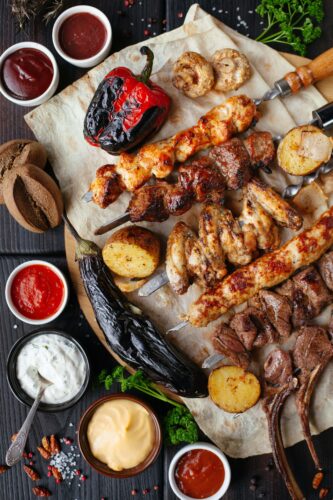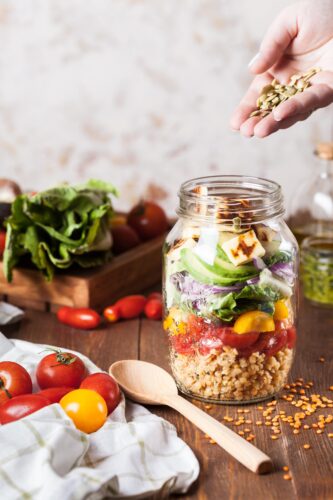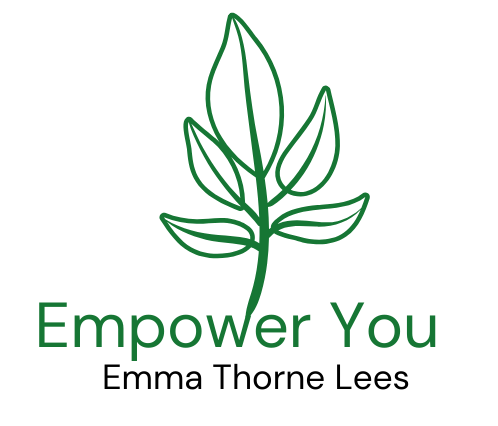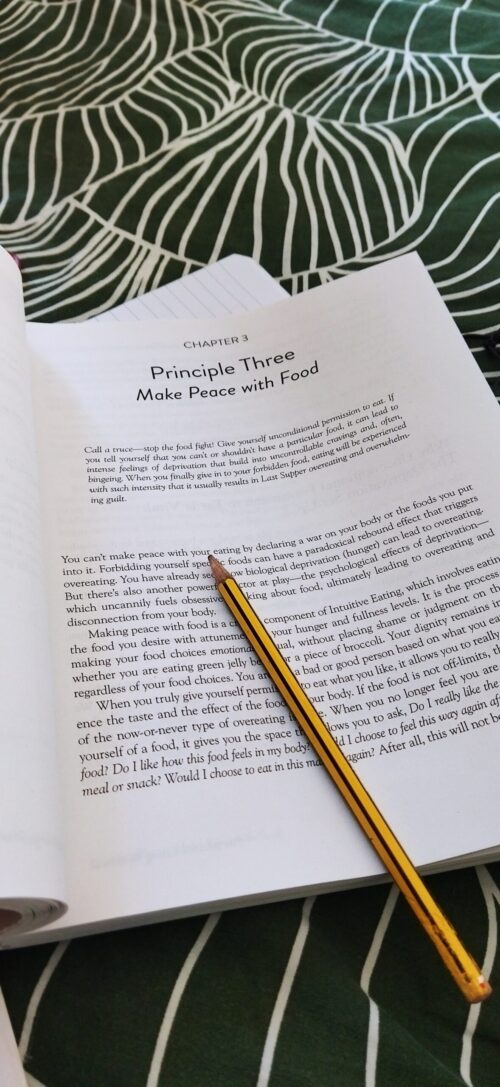Intuitive Eating – Honour your Health with Gentle Nutrition
Yes! At last I am on the 10th, and last, principle of my Intuitive Eating journey, which is all about gentle nutrition or how I prefer to call it – food to feel good! In some ways it feels a bit incongruent to have a chapter on nutrition when the rest of the principles have been about listening to our bodies, but loving our bodies is also an important part and Evelyn Tribole and Elyse Resch go to great pains to frame this chapter in a way that supports rather than prescribes, it is not an easy balance.
This is the last chapter in the Intuitive Eating book for good reason as nutrition can so easily be turned into another way to judge ourselves, food and return to diet culture. Coming to this last assumes we are well on our way to being intuitive eaters and have rejected diet culture and are listening to our bodies and our needs. That said, it also recognises that we may not be ready for this principle just yet and it could trigger a return to judging foods and old ways of thinking and doing. In which case it is better to hold off going there until you feel ready.
Nutrition, Health and Longevity
The book goes to great pains to elaborate on things that have more of a profound impact on health and longevity including the importance of social connection, the affects of traumatic childhood experiences and social factors e.g. poverty, access to healthcare.
And that the CDC estimates that genes, biology, and health behaviours together account for about 25% of population health, which is certainly less than I would have imagined.
Yet despite these facts so much of our western culture is entrenched in a massive focus on food – food guilt, food worry, food being the primary focus of so much related to health. It appears that our media is hyper focused on it and with the plethora of information that is available to us it is easy to get confused, worried or even fearful around food. I know I certainly have been curious about whose perspective to trust around health and diet.
This can all feed (so no pun intended!) into more food fears and perpetuate the cycle of deprivation as the only means to which we feel like we are in some kind of control.

Different Food Cultures
Interestingly looking at research, Americans are seen as the biggest worriers about food, as opposed to French who generally focus on the pleasure of food. Yet despite this and a diet that is rich and flavourful, France has fewer eating disorders, fewer people on diets, higher life expectancy and lower heart disease death rates.
Why is that?
Tribole and Resch and others who have researched into this attribute this to a variety of factors from having a different approach to food (pleasure mainly), taking their time to eat, the medical system being less medication focused than lifestyle focused in France.
In so much of US and some other western cultures food is consistenly labelled as good and bad and an obsession over our bodies and shapes. This has probably not been aided by a focus on nutrition labelling also which has deepened the focus on healthy eating and weight stigma. Instead of tuning into what we and our bodies want and need we are externalising based on numbers, labels and external factors further perpetuating our disconnection.
A Different Perspective towards Food
We can often tend to ignore to eat what feels and tastes good and rather opt for the low fat, healthy or what we feel we ´should´ eat in fear of not doing the right thing, getting fat or not looking after ourselves. Instead this principles invites us to continue eating what we want which actually is more likely to result in improved nutrient intake and eating a variety of foods and less likely to lead to eating disorders.
Starting to tune into our bodies and our tastes at any given time we learn to eat what we enjoy and listen to our bodies´ signals as to when we are full. Far more empowering and likely to satisfy then eating through guilt, fear or just being out of touch with what we really want.
Allowing ourselves to not just eat some types of food to give ourselves full permission to eat whatever is so liberating. To experiment with new flavours, tastes, trying different products that we previously off-limits can awaken our taste buds and result in us eating more in line with what we want than out of habit or restriction (or binging). All whilst bearing in mind that what we eat for one meal, one day or even longer has no real impact on our health, it is how we behave over time that counts.

Changing our Approach to Foods
So instead of deprivation or making do with inferior products we can eat what we truly want. No more bland tasteless alternatives instead enjoying what you put in front of you! Yes, consider nutrition, but also consider taste, they are both important!
Again when thinking of portion control – listening to our bodies is key instead of deprivation or eating out of habit – listening to our bodies´ signals and actually paying attention whilst we are eating (instead of being distracted or eating out of habit).
Yes, if we eat higher amounts of fruit and vegetables we will generally improve our health, but again we should still enjoy how we eat these it doesn´t have to be just veggie sticks, salads and an apple. Mix it up, try new recipes and combinations and allow yourself to experiment and see what you enjoy.
Yes, we do need to make informed food choices, but they primarily need to be based on getting satisfaction from our meal and that means both during and after. If we know that eating some foods results in discomfort afterwards then we need to consider this. Equally if we have a medical condition then taking this in consideration is also important to your food choices, whilst still enjoying food and meals. With all of the choices we make it needs to be based on what we enjoy and what we feel is best for us in that moment, without being attached to losing weight, guilt, fear, etc, etc.
It is simple, but not easy as we still may need to disentangle ourselves from diet culture and the sneaky ways it creeps into our subconscious and conscious mind without us even knowing

Reflection
This Principle is not an easy one to navigate as it feels a little contradictory to some of the previous ones – eat healthily but also eat whatever and whenever you want. It can be easy to get confused. That said I think it is also common sense to acknowledge that we all know that our bodies and we (generally) enjoy a variety of foods. If we have access to food that we enjoy the taste of and it also makes us feel good then it makes sense for us to continue eating in this way. If there is a food choice that tastes good and has higher fibre, vitamins or nutrients than another that has similar taste then by all means eating the ´better´ food makes sense. It is not about creating another set of rules or restrictions for ourselves. Yet again it is about allowing ourselves to enjoy our meals, eat what and when we want, listen to our bodies and our needs and take responsibility for our own choices without taking on board other people´s judgment, fears, choices too.
Again, as with all the principles which are inextricably linked, this takes time, awareness, patience and self-compassion. It is a repeated daily practice, not something we can just flick a switch on and it is done. One day will be different to the next. One day I will feel like eating a plate of fruit another day only chocolate will do the trick and that is ok. Remembering the goal is not to lose weight or create anything else for ourselves rather than nourishing our bodies in a way that feels and tastes good at that time. This may be with food, with rest, with spending time with others or whatever it might be, food is not always the answer. But, if we are hungry, allowing ourselves and learning to tune in, listen and respond to what we want and need in that moment.

Whilst I may have read all the Intuitive Eating principles and explored them in depth, I certainly do not feel like I have fully integrated them despite this being a journey of more than a year! I feel that this is something that I need to keep reviewing and reminding myself of until it becomes second nature. The good thing is whilst I would like to be an intuitive eater, I am in no rush, I have had many many years of being part of diet culture and growing up around a pretty fatphobic society. This takes time to dismantle and to evolve into who I am and what I want and need each and every day. I also acknowledge that I need to practice being more in tune with my body generally through movement and being more present when I eat – these are possibly my biggest barriers. I know that there are times that I have certainly felt a lot more intuitive in my eating and living a slower, more present life was absolutely central to that.
As you may have noticed this post has included a lot of pics of food and drink. Curious to know if you had any judgment or thoughts around any of them? I know I still have some (yet more work to do, eh?!!) Is there anything in particular you fancy right now?
What do you think about honouring your health with gentle nutrition? How do you feel about Intuitive Eating generally? Have you been able to reject diet culture and eat more aligned with how you and your body feels? As always, I would LOVE to hear your experiences, thoughts, ideas and questions so please do comment below.
Images: Mariana Medvedeva, Mariana Medvedeva, Victoria Shes, Pushpak Dsilva, Aleksandra Dementeva




thanks for info
Thanks for your comment. Hope you found it of use, Liana.